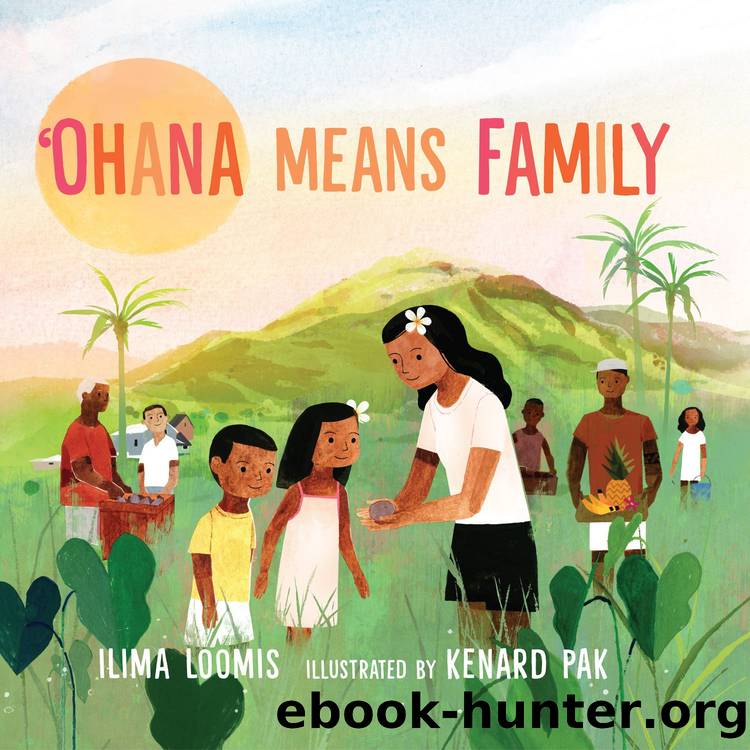Ohana Means Family by Ilima Loomis

Author:Ilima Loomis
Language: eng
Format: epub
Publisher: Neal Porter Books
that feeds the stream of sunlit gold,
flooding the land thatâs never been sold,
where work the hands so wise and old,
that reach through the water, clear and cold,
into the mud
to pick the kalo
to make the poi
for our âohanaâs lÅ«âau.
A NOTE ON KALO AND POI
The origin of kalo, also known as taro, is directly connected to
the genealogy of the Hawaiian people. In a story passed down
from generation to generation, WÄkeaâthe Sky Fatherâand
Hoâohokukalani gave birth to a stillborn child and buried
him near their home. From their infantâs earthen grave grew a
kalo plant, which they named HÄloanakalaukapalili, meaning
âquivering long stalk and leaf.â Later, a second child was born
and named HÄloa; he became the first kanaka, or Hawaiian.
This is why kalo is not just considered a plant, but honored as
the elder brother of the human race.
Hawaiians cultivated kalo for more than a thousand years, and
they continue to do so today, in both irrigated ponds, called
loâi kalo, and in gardens, called mÄla âai. Hawaiians grew more
than 400 varieties of kalo, each having unique characteristics,
tastes, and uses. Kalo is a highly nutritious food, and all parts
of the plant are eatenâfrom leaf to corm.
The most common way of eating kalo is pounded into a
smooth paste, called poi. To make poi, the corm is steamed
and pounded into a mash, called paâi âai, with a stone pounder,
called pÅhaku kuâi âai, on a wooden board, called papa kuâi âai.
When the paâi âai becomes smooth, it is placed into a calabash,
called an âumeke, and mixed with small amounts of water to
become poi.
Poi was the staple food of Hawaiians, and it is still cherished
today. âOhana put their conflicts aside when poi is present,
because it is considered disrespectful to quarrel in front of
elders. Poi is often the first food given to babies, and no
celebratory lÅ«âau is complete without it.
âHÅkÅ«ao Pellegrino
Nohoâana Farm
WaikapÅ«, Maui, Hawaiâi
A NOTE from the author
It is through a shared meal that we come together as a family.
An âohana can include not just parents, children, brothers, and
sisters, but also neighbors, visitors, and friends old and new.
Food connects usânot just with one another, but with the
whole world. The land, the water, the air, our community, and
even the sun come together in every bite. It is this connection
that I hoped to honor when I sat down to write about the most
traditional Hawaiian food, poi.
âIlima Loomis
GLOSSARY
Kalo â the taro plant, Colocasia esculenta
Kanaka â human being, man, person, Hawaiian
Loâi kalo â wetland pond, used for cultivating kalo
LÅ«âau â a Hawaiian feast, this word is also used to describe the
cooked kalo leaf
MÄla âai â garden, cultivated field,
usually rain fed
âOhana â family, relative
Paâi âai â hard, hand-pounded kalo
Papa kuâi âai â the wooden board on
which kalo is pounded
PÅhaku kuâi âai â the stone tool
used for pounding kalo
Poi â the starchy paste made from the
cooked corm of the kalo plant, a staple
Hawaiian food
âUmeke â bowl made from calabash
gourd or wood
Download
This site does not store any files on its server. We only index and link to content provided by other sites. Please contact the content providers to delete copyright contents if any and email us, we'll remove relevant links or contents immediately.
Southern Living 2023 Annual Recipes by Editors of Southern Living Editors of;(707)
The Gilded Age Cookbook by Becky Libourel Diamond(645)
Southern Living - Homestyle Cookbook by The Editors of Southern Living(606)
Alaska Sourdough, Revised Edition by Ruth Allman(601)
The Official Cookbook of the Chile Pepper Institute by Paul W. Bosland(588)
Southern Living 2022 Annual Recipes by Southern Editors of;(586)
Southern Living - Slow-cooker Cookbook by The Editors of Southern Living(582)
Southern Living Annual Recipes 2012: Every Single Recipe from 2012 -- over 750! by Editors of Southern Living Magazine(552)
Forage. Gather. Feast. by Maria Finn(540)
Chili madness : a passionate cookbook by Butel Jane(537)
Truly Texas Mexican by Adán Medrano(536)
Borealis Breads by Jim Amaral & CYNTHIA FINNEMORE SIMONDS(532)
Southern Inspired by Jernard A. Wells(524)
New England Soups from the Sea by Craig Fear(503)
Southwest Table by Dave Dewitt(502)
Lilo and Stitch: The Official Cookbook: 50 Recipes to Make for Your 'Ohana by Tim Rita(495)
Pulp by Abra Berens(490)
My Vermont Table by Gesine Bullock-Prado(487)
Sisters by Louisa May Alcott(486)
